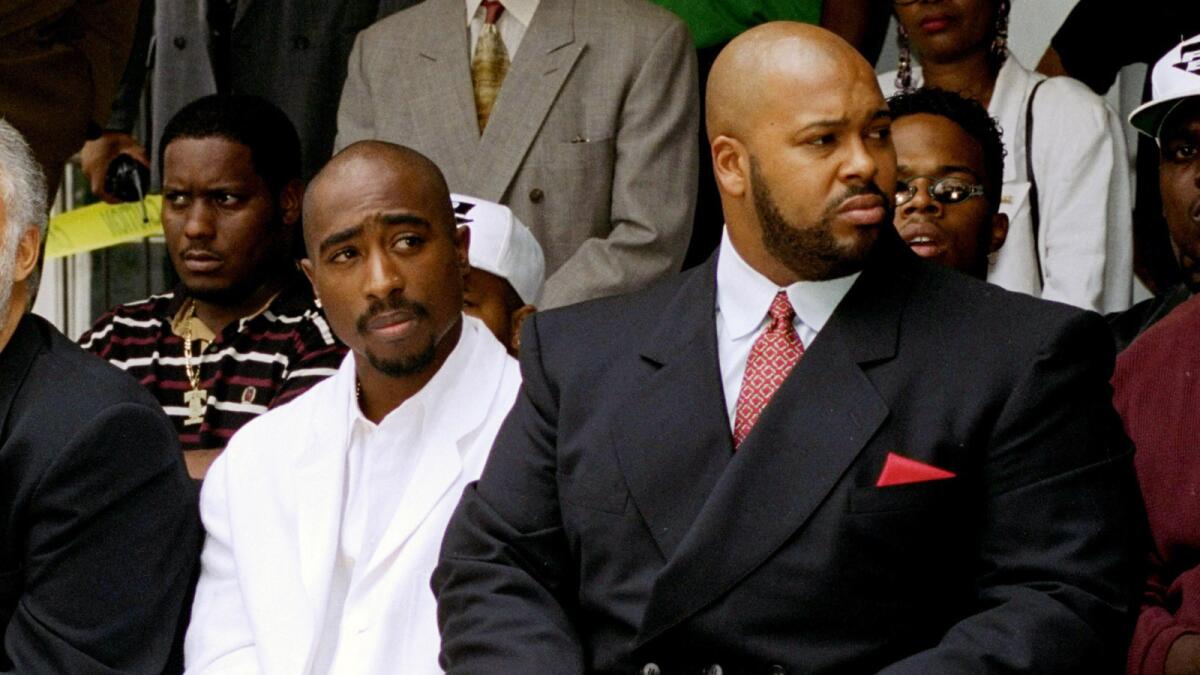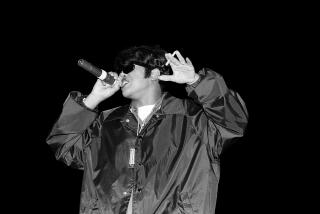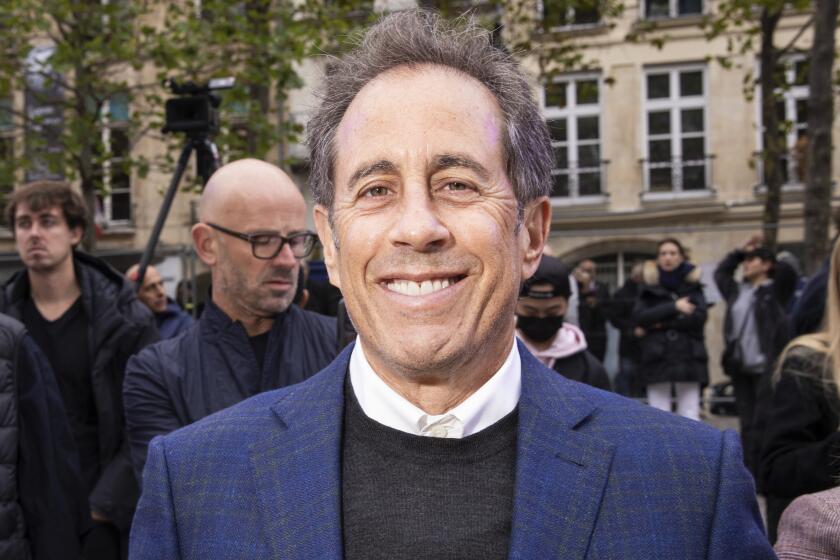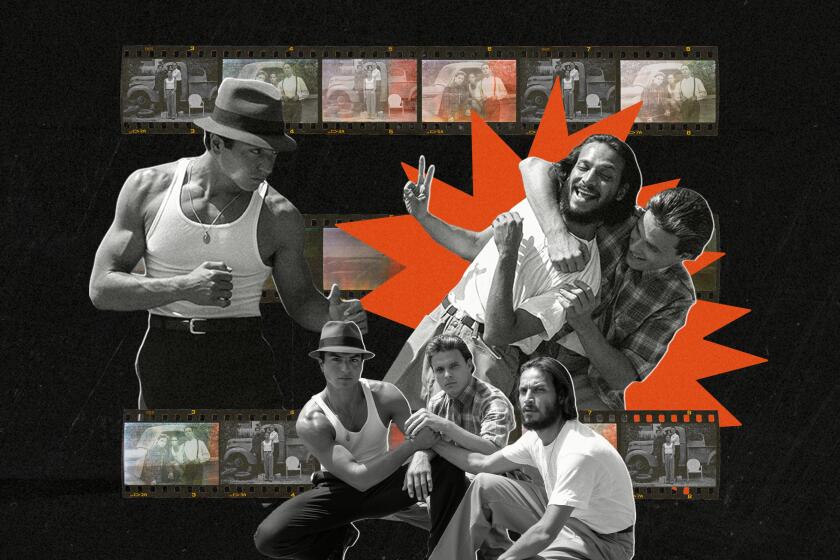From the Archives: Suge Knight’s empire has dwindled, but he sees only possibilities

The party at the Playboy Mansion was over hours earlier, and as the clock ticked toward 4 a.m., Marion “Suge” Knight was back in his darkened office and puffing on a Cuban cigar. Over his shoulder, the framed platinum albums glinted like chrome rims in a low fog. It was then, as so often happens with the rap music mogul, that the topic turned to murder.
“I’m a product of the inner city, and if you’re from off the block, more than likely, you’re going to go in a violent way or spend your life in prison,” he said in a near whisper. “But no matter what, mine will be a peaceful death. You see, I have made history. And I know one thing: Ain’t no man can stop me from going to heaven.”
The late hours and ominous talk are trademarks of the 37-year-old Knight, the founder of Death Row Records. In the 1990s, Knight’s company pushed hard-core rap into the music mainstream and generated $100 million a year in album sales at its peak. But along the way, its chief became infamous for a strong-arm style and his proximity to people who ended up dead.
RELATED: ‘Suge’ Knight, no stranger to legal trouble, faces most serious charges
Just two weeks ago, 175 heavily armed sheriff’s deputies swarmed Knight’s office, his homes in three cities and a dozen other sites as part of a slaying investigation. Three men identified as Knight associates were arrested but were later released and not charged. A fourth Knight associate was charged in a Nov. 26 attempted murder warrant and remains at large. Investigators have said Knight is not a suspect in the ongoing probe.
------------
For the Record
Los Angeles Times Tuesday December 10, 2002
A Wednesday Calendar story about music mogul Marion “Suge” Knight misspelled the first name of Hyun Kim, an editor with Vibe magazine, as Huyn.
------------
“The taxpayers,” Knight said, “are the ones that should be outraged here. All this, for what?” He declined further comment on the police probe, which centers on factions of the Bloods and their alleged roles in a June 7 killing and an Oct. 22 attempted murder. Knight has long been associated with the Bloods and through the years has hired the gang’s members as employees.
The hulking Knight has never minded the whispers that follow him. Just the opposite. The former football player exults in the idea of himself as a John Gotti from Compton, a celebrity tough guy in a killer wardrobe.
RELATED: Suge Knight remains stuck in a gangsta rap past
Now, though, the murmurs at music industry events have a different Suge subplot: Does Knight even matter anymore?
Knight has heard the doubters and agreed to two interviews in the past week to answer the question of his music industry relevance.
In both he presented himself as a serene businessman who is passionate about music and relentlessly optimistic. He is inconsistent when speaking about matters of the street; he presents himself as a survivor who has outgrown the gang scene and its violence, but every time he goes into the studio he walks beneath a handwritten sign: “Keep it Gangsta.”
At its peak, Death Row Records was a hit factory led by superstars Tupac Shakur (who recorded as 2Pac), Dr. Dre and Snoop Dogg, and Knight was the dealmaker and details man. But the slaying of Shakur, the defections of Dre and Snoop and Knight’s own imprisonment have left that empire diminished.
Renamed simply Tha Row, Knight’s company now finds its biggest hits in the music of its past, such as “Better Dayz,” a posthumous package of unreleased 2Pac music that today will debut high on the nation’s album chart.
But Knight says there is only one full album’s worth of unreleased Shakur music remaining. The long-term health of Tha Row will be determined by its new stars. “Death Row is all pictures and memories,” Knight acknowledges, “and now it is about Tha Row ... “ And so far Tha Row has yet to prove the doubters wrong. The debut album from its most promising new talent, Long Beach rapper Crooked I, was due in stores in September but has yet to be released.
“This is a guy who was a folk hero and a guy everyone talked about or feared,” said Huyn Kim, an editor at Vibe, the hip-hop magazine that has tracked Knight’s exploits for years. “But now, well, he has to show he can start over and there’s a lot stacked against him.”
More than a dozen music executives, artists and top publicists interviewed for this story agreed with that appraisal, but none would say it on the record.
“The problem is if you publicly say that Suge still matters, you look like an idiot to everyone,” said one publicist with a client list that includes major rap artists and executives. “And if you say he doesn’t, well, then you have to deal with Suge.”
The name Suge is pronounced like the first syllable of “sugar,” and it’s short for “Sugar Bear,” a childhood nickname that still fits the demeanor of Knight in one-on-one conversation. His casual voice is quiet and without sharp edges. His 6-foot-3, 320-pound frame clearly belongs to a former athlete, but there is also a softness to his wide grin.
Knight is a difficult man to reach. His company is small and insular, and the doors are always locked at his offices in the mirrored-glass building on the corner of Wilshire and San Vicente boulevards. After years of scrutiny by investigators from the LAPD, FBI, IRS and others, there is a logical reticence among Knight’s circle of associates. It extends to the media, too, after countless articles on the mogul’s exploits (the most frequently repeated anecdote is rapper Vanilla Ice’s claim that Knight dangled him from a balcony in a business dispute, which Knight denies) and the recent film “Biggie & Tupac,” which points to Knight as a menacing figure and possible murder conspirator.Still, this past week he welcomed a reporter into his offices and his studios and was relaxed enough to munch on tacos and watch ESPN in the same building where SWAT officers prowled the corridors just two weeks earlier. He agreed to answer all questions, but it became clear that queries about crime or his family life would get only vague or philosophical answers. He described himself again and again as a devoted son, a doting father of four and the rare rap-world celebrity that needs no bodyguards.
“I am a happy man, a free man, a blessed man,” he said. “My life is not a complicated life because of that happiness.”
::
Knight’s internal cheer does not sway everyone. Las Vegas Mayor Oscar Goodman, for example, said he was stunned by the visceral reaction last year to Knight when he visited the desert city.
“He came into town and wanted to know if there was interest here in him doing a Death Row Records equivalent out of Las Vegas,” Goodman said. “I said I was happy to talk about it. He was spotted in my office and word got out and the public went nuts saying, ‘We don’t want him in this town.’ That drove him away.”
It was in Las Vegas that Knight weathered the most infamous night of his life. It was Sept. 7, 1996, when video cameras in a hotel lobby captured images of Knight, Shakur and others brutally beating down a gang rival. That was just hours before Knight was wounded and Shakur was mortally wounded in a shooting attack.
The casino assault eventually put Knight in prison for five years -- it was a violation of his parole and came after previous convictions on assault and federal weapon charges. The Shakur killing became a flashpoint in rap violence, which would crescendo again in March 1997 with the slaying in Los Angeles of Shakur’s archrival Christopher Wallace, the rap star known as the Notorious B.I.G. Police say both killings remain unsolved.
Knight’s name is so frequently mentioned in the theories surrounding the two deaths that he has become a walking symbol of the rap industry’s bloodshed.
Through the years Knight has been contemptuous or cryptic when asked about either shooting. On Saturday night, at a Burbank recording studio, he said he has no insights to offer.
“When God puts a period on something,” he said, “who am I or anyone else to put a question mark? The past is the past.”
Knight grew up in Compton the youngest of three children, and his father, a truck driver, encouraged him to find discipline through sports. His high school football exploits led him to the University of Nevada Las Vegas and then, briefly, to the roster of the Los Angeles Rams. A post-sports stint as a bodyguard inserted him into the music industry.
Dr. Dre was already known for his work with seminal rap group N.W.A, and in 1992 he and Knight launched Death Row Records. A lawsuit filed by Eazy-E, another N.W.A member, claimed Dre was freed from his previous contractual commitment by Knight’s use of a lead pipe as a negotiation tool. Knight has denied that account but settled the lawsuit. Death Row was on its way and would become a powerhouse by decade’s end.
“I did something that people thought could never be done and never would be done,” Knight said. “It became history.... If you make history once, people are going to say you’re a genius or you were lucky. But make history twice? That is unheard of.”Specifically, he wants to make history by adding a second act to his career as mogul. Even the skeptics find it hard not to watch.
For example, at the Playboy Mansion party last Tuesday, the sight of Knight making his way through the crowd was like watching a hurricane tracked on a weather map -- a swirl forms and follows in his wake.
Knight came to the party in a light-blue denim shirt, matching jeans and immaculate white sneakers -- a uniform similar to prisoner togs at Mule Creek State Prison. He chuckled at the thought. “Yeah, I told myself when I came home, no more denim. But then again, it’s a different situation now. And you got to always humble yourself.”
Knight may be humbling himself regarding regional pride as well.
The Playboy Mansion event was an album release party for Ja Rule, the star rapper from Queens, N.Y., who is signed to the East Coast-based Murder Inc. Records. Knight and the guest of honor greeted each other warmly and chatted quietly about upcoming projects they will share an interest in. That’s notable considering Knight’s once rabid role in the so-called East Coast versus West Coast rap rivalry, the industry schism that was a compelling backdrop in the Shakur and Wallace slayings.
Now Knight has artists from Tha Row appearing on albums by East Coast rappers and has even allowed Ja Rule and Nas to splice Shakur recordings into their tracks, even though both of those stars are associated with the East Coast scene that Shakur publicly reviled.
A cynic would say Knight finds his allegiance where the money is, but he says he has grown beyond the mentality of rivalry. “I am still representing the West Coast like no other,” he said.
He has not shied from antagonizing his perceived foes, either.
In June, Knight’s appearance at a television awards show included an angry exchange with Snoop Dogg (the rapper also has a graphic insult song aimed at Knight on his new album). In February, the mogul shook up the West Coast gathering of a group promoting hip-hop activism and unity. Knight insulted a raft of rappers by name and was heckled by some for using raw language from the dais.
Knight says others’ perception of him is something beyond his control and beneath his attention. He also said he is no longer part of a world where violence is the currency.
“In the beginning my world was small,” he said.
“I covered a lot of ground, but it was small areas. Running around and getting in trouble, situations with constant shootouts and people going to prison, that world is small to me now. I lived that. Now my world is bigger. I’m above it. Now instead of floor seats at the game, I got my own luxury box.”
The debts of the past still demand payment, however.
::
There’s a deep list of lawsuits against Knight and his company, many filed by former business associates, vendors, managers and artists who say they are owed money that, lumped together, is in the millions. A divorce from wife Sharitha Golden led to a 1999 court order that he pay her $735,000 in unpaid child support. A filing last month by Golden says the bulk of that money remains unpaid, although sources close to the matter say a court-created receivership siphoned about $600,000 last month from Knight’s company to go toward that debt.
The IRS also informed Knight in July that he owes about $6 million in personal income taxes. Court records also show that in recent years, Knight has been spreading his various real estate properties among other people, including several of the women in his life, among them Michel’le Toussant, an artist on Tha Row and Knight’s third wife. Those properties include his Malibu mansion and a Las Vegas home used by Martin Scorsese in the filming of “Casino.” He recently sold his lavish Tarzana music studios as well.
Still, the man who was prisoner No. 434980 leads his complicated life from a comfortable perch. He still has his Staples Center luxury box and his car collection, more than 24 vehicles -- even if some of the vintage cars in the garage of his Wilshire Boulevard office building have flat tires and looked untended.
“Next year, 2003, that will be a big year for me,” he said with unflinching confidence. He plans to publish his memoirs next year (one working title: “Suge Knight: American Dream & American Nightmare”), but even more exciting to him is the release of the debut album from Crooked I. At a studio in Burbank he played a track from the album, which has powerful and smooth rhymes about California and its cycle of violence.
The Crooked I album is advertised on a large billboard that crowns the label’s offices. In a way, the sign says more about the mercurial nature of Tha Row than it does about any album.
The billboard shows the rapper squatting on a toilet and the explicit caption beneath is in keeping with that image. In September, Clear Channel Outdoors Inc. filed suit claiming that Knight had hijacked the company’s sign and put up offensive material that has led to complaints from passersby. Clear Channel claims that Knight’s intimidating staffers have blocked anyone from the roof.
“They are not allowed to take it down,” he said with a laugh. “Look, if they think the sign is inappropriate, they should come meet with us. But don’t tell us what to do. Look, when you’re black and from the ghetto and in Beverly Hills, there are going to be problems. I represent the ghetto. I represent the good and the bad, what can be and what is. And some people are scared of that.”
Times staff writer Louise Roug contributed to this story.
More to Read
The biggest entertainment stories
Get our big stories about Hollywood, film, television, music, arts, culture and more right in your inbox as soon as they publish.
You may occasionally receive promotional content from the Los Angeles Times.






